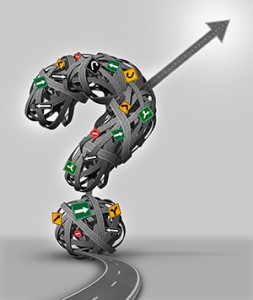 In our business solutions class we have been studying product and process innovation and the need to maintain the right balance between desired features and unmanageable complexity. After the recent high profile outages at the New York Stock Exchange and United Airlines, I wonder if the balance has tipped toward the latter. Both outages reportedly happened because of software upgrades and the interaction between the old code and the new code. In some instances, there is so much complex code that no one can tell what is going to happen.
In our business solutions class we have been studying product and process innovation and the need to maintain the right balance between desired features and unmanageable complexity. After the recent high profile outages at the New York Stock Exchange and United Airlines, I wonder if the balance has tipped toward the latter. Both outages reportedly happened because of software upgrades and the interaction between the old code and the new code. In some instances, there is so much complex code that no one can tell what is going to happen.
Elegant Simplicity
I believe that there is a sweet spot between simplicity and complexity that I call elegant simplicity. Oliver Wendell Holmes Sr. is reported to have said: “For the simplicity on this side of complexity, I wouldn’t give you a fig. But for the simplicity on the other side of complexity, for that I would give you anything I have.” There is a big difference between crude simplicity and elegant simplicity. Perhaps you have come across a product, service, or process that is well thought out and just works, every time. Here are a couple of my favorites, and I invite you to write to me about yours.
Netflix
As I shared with our class, I love the Netflix service. I have been a customer for several years and it always works as promised. I am a DVD customer and I have established a personal queue from their selection. As soon as I am done watching the current DVD, I send it back in the prepaid envelope and the next one in my queue comes very quickly. They send me unobtrusive e-mails to let me know that they have received my DVD, and another e-mail to let me know that my next movie is on its way. I just received notification that they are consolidating both of those e-mails into one, to further reduce the mail in my inbox. They read my mind. Netflix does the job I need to have done and no more. They have fulfilled my definition of elegant simplicity.
Internet Radio
Another example of a product that for me just works is my internet radio. This is a recent purchase that I easily connected to my home sound system and my wireless router. I then found several stations that I listen to on a regular basis. This product is complicated, but the interface is intuitive, either from the front panel, the remote, or from the smartphone app. I can access several thousand stations and it delivers exactly what I need and no more. It can be as elaborate or as simple as I want it to be.
These examples highlight products that are complex under the surface but provide a simple user experience and are reliable. In these I have found elegant simplicity free of the complexity that could make them unreliable.
Thoughts
I am going to strive to find that spot of simplicity on the other side of complexity in my writing, my work, and my life. Will you join me? Do you have examples of products, processes, or services that make you smile? Our innovation class would love to hear from you and learn from your experiences.
Kelly Brown is an IT professional and assistant professor of practice for the UO Applied Information Management Master’s Degree Program. He writes about IT and business topics that keep him up at night.



